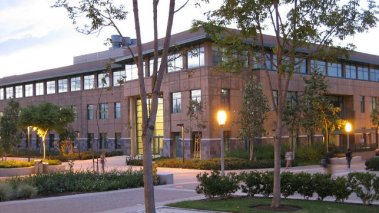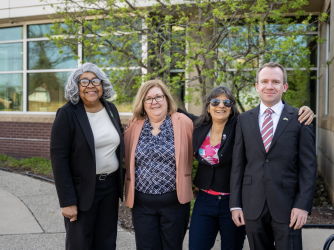Table of Contents
College Republicans event featuring Israeli reservists disrupted at UC Irvine

Last Thursday, protesters at the University of California, Irvine disrupted a panel discussion featuring members of the Israeli organization Reservists on Duty that was hosted by the university’s College Republicans chapter.
The event, which featured members of the Israel Defense Forces, was running as planned through the first 40 minutes before a group of protesters trickled in. After taking seats in the nearly-full classroom, the protest began when one of the people who had just sat down interrupted the speaker to ask, “You guys talking about how it’s cool to shoot the kids at the Gaza border?” As the moderator was asking people to wait until they were called on to ask questions, the protesters began to loudly chant, “IDF, what do you say? How many kids have you killed today?”
During the several-minute disruption, the protesters continued chanting and waving signs and flags. One of the protesters used a megaphone. Another protester reportedly called one of the speakers a “Christ killer,” although it’s unclear from the reporting whether that happened during the protest or after the event concluded. The disruption ended only when police eventually escorted the disruptive people out of the classroom. The police also escorted the speakers to their cars after the event concluded to ensure their safety.
The incident has been cited as further proof of growing anti-Semitism on campus, and certainly, most people would consider calling a Jewish person a “Christ killer” to be an example of anti-Semitic rhetoric. But whether the chanting and the protest more generally was anti-Semitic, or simply heated political rhetoric over a divisive political issue, is irrelevant to whether the disruption was constitutionally protected. It was not.
But whether the chanting and the protest more generally was anti-Semitic, or simply heated political rhetoric over a divisive political issue, is irrelevant to whether the disruption was constitutionally protected. It was not.
Critics of the protesters are right that disruption did not constitute protected speech. While many forms of protest are protected under the First Amendment, the First Amendment does not offer protection to those who substantially and materially disrupt planned events held in reserved locations. This is true regardless of the content or motivation of the disruption.
When a public space is reserved, those who reserved it generally get to set the rules during the period of the reservation. This is as true when someone reserves a room to hold an event on a contentious political issue as it is when a spot in a public park is rented for a wedding. The College Republicans asked that all questions be held to the end and that people wait until they were called upon to ask their questions. The protesters did not comply with these requests and chose to disrupt the event instead.
Had the protesters been outdoors, there is no doubt that their chants would have been protected speech, assuming only that it was not so obstructive or loud as to prevent people attending the event from accessing it or hearing it. Allegations of genocide — even those that are hotly contested or unfounded — constitute quintessential political speech at the core of the First Amendment’s protections.
Critics of Israel and its policies must be free to put these accusations on the table and must be given the same rights to speak their minds through lawful protest as everyone else. And defenders of Israel’s policies enjoy that same right to political expression; they too are part of the “everyone” who has the right to free expression. This point is worth repeating because FIRE has seen people on both sides of the Israeli–Palestinian debate try to silence their adversaries. This time, it was the pro-Palestinian protesters who attempted, until the police intervened, to shut down an event because they didn’t agree with the views presented by the speakers. A principled defense of free speech requires opposition to those that would use the heckler’s veto regardless of who is attempting to use it.
It’s important to note that while this kind of disruption is not constitutionally protected, simply calling a Jewish student a “Christ killer,” falls shy of being actionable harassment. The two terms are not synonymous. For student-on-student speech to be actionable as discriminatory harassment, it must be targeted, discriminatory, unwelcome, severe, pervasive, and objectively offensive such that it infringes on the ability of the target to enjoy equal access to the educational opportunities and benefits provided by the school. A single insult generally fails to meet the pervasiveness component of the test. Moreover, one protester’s single comment is not enough to transform the acts of all of their peers into harassment.
This incident takes place against the background of an effort to legislate against anti-Semitism on campus. While it is certainly laudable to urge universities to take steps to address religious discrimination and harassment on campus, attempting to combat such problems based on the viewpoint at issue or the groups affected puts free speech at risk. People can and do disagree on whether incidents like this are evidence of anti-Semitism on campus, anti-Zionism on campus, some combination of both, or simply criticism of a foreign government’s policy that has nothing to do with religion or ethnicity. And indeed, a group of speakers or protesters against any given event are likely to have a variety of beliefs and motives, not all identical, that bring them together on a certain issue. The genius of First Amendment jurisprudence and the American approach to free speech is that it provides the tools to regulate expression (when necessary) without passing judgment on the politics, religion, or other viewpoints of those involved.
Rather than wrangle over viewpoints, a more productive approach to the problem would be to help educational institutions understand when speech crosses the legal line from protected expression into actionable conduct and for educational institutions to provide more opportunities for respectful dialogue around contentious issues. Curbing the heckler’s veto at the campus level through prompt and proportional responses is necessary. Knowing what legally constitutes harassment and when protests lose their protection is a constitutionally sound approach to addressing the campus climate and ensuring a welcoming education environment for all.
Recent Articles
FIRE’s award-winning Newsdesk covers the free speech news you need to stay informed.

VICTORY: Michigan town declares Sept. 6 ‘First Amendment Day’ after FIRE sues its mayor for shouting down residents

USC canceling valedictorian’s commencement speech looks like calculated censorship

Back into the FIRE: Hasen’s response to FIRE and Rohde: Don’t read the press clause out of the Constitution — First Amendment News 420
